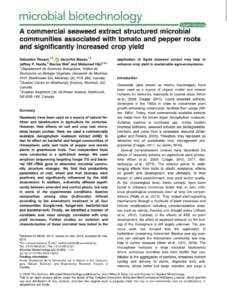Seaweeds have been used as a source of natural fer-tilizer and biostimulant in agriculture for centuries. However, their effects on soil and crop root micro-biota remain unclear. Here, we used a commercially available Ascophyllum nodosum extract (ANE) to test its effect on bacterial and fungal communities of rhizospheric soils and roots of pepper and tomato plants in greenhouse trials. Two independent trials were conducted in a split-block design. We used amplicon sequencing targeting fungal ITS and bacterial 16S rRNA gene to determine microbial community structure changes. We find that productivity parameters of root, shoot and fruit biomass were positively and significantly influenced by the ANE amendment. In addition, a-diversity differed signifi-cantly between amended and control plants, but only in some of the experimental conditions. Species composition among sites (b-diversity) differed according to the amendment treatment in all four communities (fungal-root, fungal-soil, bacterial-root and bacterial-soil). Finally, we identified a number of candidate taxa most strongly correlated with crop yield increases. Further studies on isolation and characterization of these microbial taxa linked to the application of liquid seaweed extract may help to enhance crop yield in sustainable agro-ecosystems.

July 25, 2019 / Article Read Document